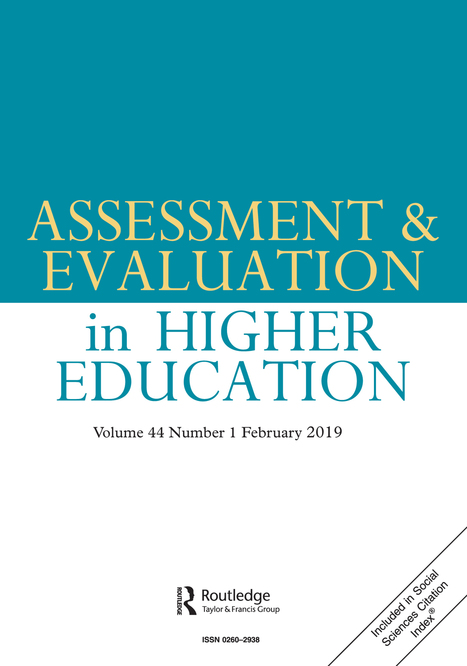 Your new post is loading...
 Your new post is loading...
Feedback seeks to help students improve in the future, while grading evaluates past learning. Often, we mix the two together, but doing so can have consequences (Winstone and Boud, 2022), for example:
Large class sizes, limited time, student motivation and staff feedback skills are some of the critical problems being reported by both staff and students.
As educators and students adapt to COVID-19 and more online learning, quality feedback is more important than ever. But, according to lead researcher Professor Michael Henderson, Federal Government changes to tertiary funding will apply “crippling” pressure on staff and universities just when more resources are needed.
The study considered the views of staff and coursework students from two Australian universities, capturing 3,807 student survey responses and 281 staff responses.
The project revealed widespread satisfaction with feedback, and numerous positive examples of practices that supported students learning as well as emotional wellbeing. However, the project also confirmed that students and staff continue to experience many challenges, revealing that feedback still needs to be improved.
When asked to identify the challenges to effective feedback, students confirmed the need for more individually tailored and detailed feedback. Specifically, they wanted comments that help them to prepare for future assignments and which identify gaps in their current performance.
“Feedback is one of the most powerful factors impacting on student outcomes, but if feedback is to be successful it needs to be detailed, personalised and useful,” says Professor Henderson.
Staff and students are on the same page with this. Many staff reported an eagerness to deliver more specific feedback to each student but find themselves up against time-constraints, made worse by large class sizes.
“Providing detailed comments takes a great deal of time,” says Professor Henderson. “Add to that large class sizes, and limited time allocation for marking.
“But it’s not just time. Personalised comments require some degree of knowledge about the background and goals of students, which is also difficult with large classes, online students, and in a limited teaching period.”
During the present pandemic, when hundreds of thousands of students are studying remotely, there is a risk of even more limited opportunities for feedback. Students have less access to staff who themselves are struggling to find new ways to effectively engage students.
As class sizes increase in today’s universities, the feedback process is further complicated by the diversity in today’s university classrooms; international students, for example, reported feeling misunderstood by their teachers and receiving different treatment. This is not limited to international students, however, with many students reporting generic approaches to marking.
“It was clear through the survey responses from staff that issues of time and scale were perceived as being beyond their control and major constraints to well-crafted personalised comments,” says Professor Henderson.
The comments of one health educator, quoted in the study, illuminate the types of pressures that teachers face in today’s crowded classrooms: “I would love to sit with each student and provide them opportunities to improve (…) but with 140 plus medical students doing many, many assessments each week it is simply not possible.”
Another participant, a science educator, explained: “it takes time to provide good, individualised feedback and the modern academic has very little of this. Workload allocation models provide only a few minutes per student.”
In addition to problems of quality of feedback practices and constraints of time and scale, Professor Henderson and his team reported that staff and students were challenged by issues of attitude, motivation and skill.
“Staff indicated that students could be unmotivated and more worryingly, not have the capability to effectively utilise the feedback that they were being provided,” says Professor Henderson. “Our research confirms that students are not necessarily receiving feedback that is useful, and when it is, need support to make the most of it.”
Both students and staff agree that educator attitudes and expertise were also a key challenge. Professor Henderson wrote, “Assessors therefore need to be more aware than ever of students’ individual circumstances, including cultural differences.” Just as importantly, “Staff need to be shown how to provide effective feedback. Feedback needs expertise and careful consideration.”
One undergraduate education student commented, “Actually teach our tutors what effective feedback is and perhaps assess some of their feedback. Some really have no clue and we need constructive feedback that empowers us to do better.”
“In this, and other studies, we have found that the vast majority of staff want to ensure they are providing their students with an education that is impactful. They want to provide effective feedback.
“However, they are facing serious challenges, not least the Federal Governments’ crippling changes to tertiary funding which inevitably make it harder for Universities to invest the much needed resources, including staff time, into this critical area of student education. Universities need every encouragement to raise the importance of feedback, as well as supporting both staff and student capability in engaging with it effectively,” concludes Professor Henderson.
Michael Henderson, Tracii Ryan & Michael Phillips (2019). ‘The challenges of feedback in higher education’, Assessment & Evaluation in Higher Education.
Eventbrite - Centre for Research in Assessment and Digital Learning presents CRADLE Seminar Series: Feedback in online learning - Tuesday, 11 August 2020 - Find event and registration information.
This research reports on the second phase of a project exploring the effectiveness of tutor to student assessment feedback. It highlights the dynamic interaction of interpersonal and intrapersona
More than ever workers want feedback, and if managers can't give it other colleagues can.
Too often, it is felt that personalised feedback can only be provided in subjects with small learner enrolments. However, this case demonstrates that personalised, high-quality feedback can be provided consistently and at scale in a large first-year subject.
In this core Health subject, undertaken by learners from a broad range of disciplines, learners complete a series of three journal entries as their major assessment piece. Learners receive audio feedback from the same educator across their three journal entries, fostering a sense of personal connection between learner and educator. Educators also receive audio feedback through the feedback moderation process, which both ensures consistency amongst the large team of educators and supports the development of educators’ own feedback practices.
The student experience of feedback in higher education continues to be less than ideal.
Despite heavy investment by universities, student experience of feedback higher education continues to be less than desirable, especially for at-risk students.
As the assignment deadline draws near, you begin to do the math in your head. If you have a 12 page paper, multiplied by 185 students, and it takes you 2 minutes to read each page…how long until your eyes cross from all this grading?!
As educators, we’re challenged to provide thoughtful, high-quality feedback on assignments for an increasing number of students in a timely fashion. On one hand, it’s important that we provide students with feedback quickly, so they can incorporate our comments into future assignments. On the other hand, if we want our feedback to be meaningful and individualized, it takes a significant amount of faculty time to grade.
One of the frustrating things I found in teaching online last semester was the lack of direct contact with students. The class felt impersonal, despite my efforts to give it life. I found that especially frustrating when I graded assignments. The feedback seemed cold and distant, even as I as I tried to point out strong areas of writing and multimedia projects.
Via Mark Smithers
|
A teacher writes about how this pandemic has proved that students need feedback, not grades.
A Film About Feedback Documentary / 2013 / 55 min / 16:9 / English A documentary featuring the innovating Feedback Method developed by DasArts in collaboration…
Feedback consistently gets a bad rap in higher education.* While we don’t intend to do feedback poorly, many forces conspire to land us in a situation where resources are limited and the student cohorts to whom we are tailoring feedback are increasingly diverse. But what if we took a different perspective on the dilemma of feedback? Making conceptual shifts away from considering feedback as only the provision of information, and towards a partnership between staff & students, with a focus on effects, might help us re-think where we devote our efforts.
If we want feedback to have an effect, there is little point investing time and effort into comments which students cannot act upon, and which ultimately do not contribute to their future learning and performance. This implies that we should concentrate on feedback earlier in a learning sequence, well before the final task. If we are keen to assure these effects take place, this also means designing subsequent learning activities and/or assessment tasks where students can apply their feedback. In a resource-constrained environment, it might also mean reducing the amount of grade-justification that goes on at the end of semester.
A focus on what the student does in feedback is particularly crucial. We cannot expect students to know how to use feedback without ever having done it before. The term ‘student feedback literacy’ has been coined, and we might therefore consider what types of activities could develop students’ abilities to seek, interpret and implement feedback. Students might also be prompted to consider multiple sources of feedback – including via peers, industry, and technology.
Thus, doing feedback better is a shared enterprise between the institution (academics, learning designers, et al.) and its students, who should engage in learning activities that cumulatively develop their capabilities to participate as partners in feedback processes. Rather than assuming that everyone already knows how to go about it, we really do need to talk about feedback.
* “Teachers commented on your work in ways that help you learn” scored 54% positive scores for undergrads in 2018 on the QILT SES, and 62% for postgrads.
Dr Joanna Tai
Senior Research Fellow, Centre for Research in Assessment and Digital Learning, Deakin University
Using the MOM model for feedback in assessment.
AbstractSince the early 2010s the literature has shifted to view feedback as a process that students do where they make sense of information about work they have done, and use it to improve th
Feedback from assessment was an area for development in nine reviews in Scotland during the last review cycle. In 2014-15 we ran a Focus On: Assessment and Feedback project. We want to look at how the sector has progressed since then.
This is something that I've also posted on my 'other' blog, based on a most excellent article that a colleague has just sent me. I've just received a reminder that I need to set up the paper & teaching appraisal for my summer school paper. This is a series of items that students can answer…
Dr. Wells recently gave a talk to faculty at Bishop’s University on assessment and evaluation strategies, hosted by the BU Teaching and Learning Centre (TLC). Below is one of the many ideas she presented during her workshop. Dr. Jessica Riddell, Chair, TLC If there is one thing we mostly agree on in the academy, is … Continue reading Colour-Coded Grading: How to Make Marking more Transparent – Dr. Elizabeth Wells, Mount Allison University →
Feedback in the classroom is often one-sided: the teacher gives feedback and the student receives it, generally relating to the quality of their work. Depending on the level of the students you teach, you may find yourself subject to student evaluation, but generally that only comes once a semester (at least at the university level), …
|
 Your new post is loading...
Your new post is loading...
 Your new post is loading...
Your new post is loading...
























